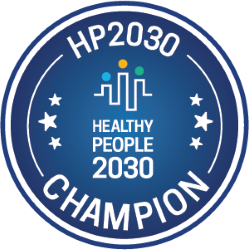June 13, 2023
The Community Health Corner

The National Extension Framework for Health Equity and Well-being recommends using community development strategies along with education and health literacy programs to ensure that everyone has a fair and just opportunity to attain their highest level of health. The following tools and resources can be used to improve health access, equity and well-being to achieve Healthy Kansas 2030 objectives and contribute to the nation’s Healthy People 2030 outcomes.
CHECK IT OUT! The Congressional District Health Dashboard, developed by the Department of Population Health at NYU Grossman School of Medicine in partnership with the Robert Wood Johnson Foundation, features data on health and the conditions that affect health in every congressional district across the country. This new Dashboard site builds on the City Health Dashboard and provides important data on health and equity for each Congressional District.
ANNOUNCE NOW: Men’s Health Month, which is June, encourages boys and men to take charge of their overall health by making healthy living decisions. In general, men in the U.S. are expected to live nearly six years less than women, and non-Hispanic Black and American Indian/Alaska Native men have a lower life expectancy than non-Hispanic white men. Men are also more likely to have lower health literacy levels than women, meaning they may struggle to find, understand, and use information and services required to make informed decisions about their health. Men’s health infographics, social media and reading resources are available here from US Health and Human Services.
LEARN NOW: The recent fires in Canada have led to poor air quality, health warnings in many eastern and midwest states. Fires, climate change, natural disasters have an impact on our overall health and well-being. The Office of Climate Change and Health Equity (OCCHE) has released it’s June 2023 Climate and Health Outlook. The June edition explores the climate-related health hazards of extreme heat, wildfire and drought.
For more information, contact Elaine Johannes, ejohanne@ksu.edu; and Stephanie Gutierrez, smgutier@k-state.edu.